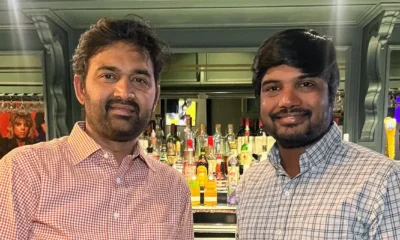Business
Hopwood Unveils the Untold Story Behind the Iconic 32-0 Straight Outta Compton Team
Michael Hopwood, a prominent figure in high school basketball history, is committed to ensuring that the achievements of his legendary Compton team are not forgotten. Growing up in Compton during the tumultuous 1950s and 1960s, Hopwood faced numerous challenges, including discrimination. Yet, he believes that education is the key to overcoming obstacles, emphasizing at a recent ASU Alumni Association event that “Knowledge is currency.” He encourages individuals to prepare for opportunities and to recognize education as a “great equalizer” for those from underrepresented communities.
Hopwood’s journey began in a rough neighborhood south of Los Angeles, where he was the eldest of seven children. His childhood was marked by a desire to participate in sports, but injuries cut short his football aspirations. When he turned to basketball, he was initially denied a tryout in junior high. Nonetheless, a pivotal encounter with Coach Jim Newman helped him embrace his potential. During the summer before high school, he honed his skills, eventually securing a spot on the varsity team at Compton High School.
As a freshman, Hopwood’s talent shone brightly, contributing to a team that boasted a remarkable 26-4 record. His perseverance paid off when, during a crucial playoff game, a controversial call led to a loss, sparking a determination among the players to never experience that feeling again. “Coach [Bill] Armstrong told us that if we didn’t want to feel this way again, we had to be 20 points better than the other team,” Hopwood recalled.
Throughout his senior season, the Compton Tarbabes, led by Hopwood, dominated, finishing with a perfect 32-0 record and claiming state and national titles. Hopwood served as team captain and was named state tournament MVP. The experience fostered a deep bond between the players and their community, particularly after the controversial game at Morningside High School. “We felt an obligation to do well and set an example for those who would come after us,” he said.
Although the team’s winning streak ended in 1970, the record of 66 consecutive victories remains unbroken. Hopwood reflected on a 2003 slight when the California Interscholastic Federation failed to recognize Compton’s legendary teams amongst the top athletes of the century. Motivated by this omission, Hopwood pursued funding for a documentary titled Living Legends 66-0 to ensure the story of his team was told. He successfully raised nearly $15,000 to document not just the wins but also the challenges they faced, including racism and discrimination.
Featuring testimonials from notable NBA figures and sportswriters, the documentary tells a comprehensive story. Hopwood, who spent six years working on it, remains focused on conveying the team’s legacy. Despite a legal battle that delayed distribution, he continues to advocate for the significance of their story. “I never went into it trying to make money,” he stated. “I wanted to document the sacrifices that went into it. Each one of those guys went on to impact the lives of others.”
After his basketball career, Hopwood transitioned into education, aware of the power it holds. He earned degrees in business education and educational administration, later obtaining a doctoral degree in ministry. His commitment to education led him to serve as a teacher and coach, and he eventually coordinated operations for schools across Los Angeles. He founded Safe Passage Programs, aimed at providing safe routes for students in high-risk areas.
Through various platforms, including speeches, Hopwood’s consistent message remains: “Education is a form of service first and foremost.” He advocates for creating an environment where students and teachers can pursue education without fear. Hopwood’s philosophy emphasizes the importance of contributing positively to society, a perspective shaped by both his personal experiences and professional journey.
Reflecting on his achievements and community service, Hopwood humbly stated, “I focused on being a fountain and not a drain.” His life exemplifies a commitment to educational equity and community empowerment, leaving a lasting impact on those he has influenced.


















